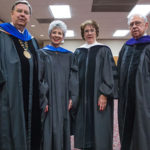Three Texas pastors stand on the leading edge of a major cultural shift. And the movement could enable both conservative and liberal churches to emphasize the vitality and importance of marriage.
As the Baptist Standard previously reported, pastors Brent Gentzel of Kaufman, Kyle Henderson of Athens and Kris Segrest of Wylie are urging ministers to stop signing marriage licenses. The practice—which makes the minister a de facto government official—creates an unhealthy marriage between church and state, they contend.
 Editor Marv KnoxAccording to the pastors’ concept, a couple could join themselves in holy matrimony through a covenant marriage ceremony at church and go to the courthouse to make their union official in the eyes of the state.
Editor Marv KnoxAccording to the pastors’ concept, a couple could join themselves in holy matrimony through a covenant marriage ceremony at church and go to the courthouse to make their union official in the eyes of the state.
Turns out, their view has gained traction among Americans at-large. A new LifeWay Research poll reports almost 60 percent of Americans believe government should not define or regulate marriage. And 36 percent of Americans believe “clergy should no longer be involved in the state’s licensing of marriage.”
Pastors aren’t so keen on the idea. Only 24 percent agree clergy should divorce themselves from signing marriage licenses. But the three-quarters of pastors who disagree should reconsider.
Why change?
Four reasons stand out …
First, if pastors narrow their congregations’ focus to blessing religious covenant marriages and refuse to sign marriage licenses, they will restore Baptists’ historic emphasis on the separation of church and state.
Second, this notion is more than a historic footnote. The principle ideally creates “a hedge or wall of separation between the garden of the church and the wilderness of the world,” insisted Roger Williams, founder of the first Baptist church in America. Williams’ ideal—later echoed by Thomas Jefferson—should appeal across the political spectrum. For conservatives, it protects the church from government intrusion. For liberals, it protects government and society in general from sectarian religious zealotry.
Sign up for our weekly edition and get all our headlines in your inbox on Thursdays
Looking to the future, the third reason builds upon the second. Even though the First Amendment protects the free exercise of religion, some Americans—including many conservatives—worry the broadening legality of gay marriage could mean ministers would be forced to marry homosexual couples. But if a church does not provide traditional marriage services, including validating a marriage license, and only offers a specifically religious covenant marriage ceremony, then the minister would be exempt from compulsory state service—signing a marriage license.
Focus on the faith aspect of marriage
And finally, the practice would help churches—whomever they choose to marry or not to marry—focus on the divine notion of marriage. It would enable them to deepen their emphasis on the faith aspect of marriage, to help couples both confront and embrace the spiritual dimension of their marriage as a lifelong commitment that involves not only them, but also God as the center of their home.
Of course, implementing covenant marriage will require ministers and congregations to change longstanding policy and practice. It also will require couples to participate in a two-step commitment process—and some will choose to bypass the church ceremony altogether, since they will be married legally after their trip to the courthouse.
But this idea offers a win-win-win-win scenario: Affirm historic church-state separation. Protect the church and state from each other. Guard clergy and churches from political/regulatory intrusion. And heighten the spiritual emphasis on marriage as divine covenant.
Churches and pastors should talk about this long and hard in the coming new year.














We seek to connect God’s story and God’s people around the world. To learn more about God’s story, click here.
Send comments and feedback to Eric Black, our editor. For comments to be published, please specify “letter to the editor.” Maximum length for publication is 300 words.